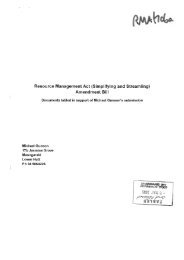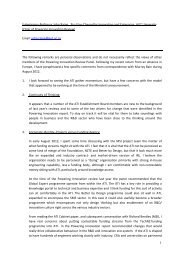Full paper text [PDF 3515k] - New Zealand Parliament
Full paper text [PDF 3515k] - New Zealand Parliament
Full paper text [PDF 3515k] - New Zealand Parliament
You also want an ePaper? Increase the reach of your titles
YUMPU automatically turns print PDFs into web optimized ePapers that Google loves.
CASE STUDY:<br />
Achieving compensation<br />
and redress for breach of rights<br />
Two health and disability service providers<br />
agreed to pay compensation to the<br />
estate of a 43-year-old female consumer<br />
unlawfully detained in a secure dementia<br />
unit for more than a year. The Human<br />
Rights Review Tribunal made declarations<br />
against the two providers for failures of<br />
care and breaches of the woman’s rights.<br />
The consumer (who has since died) had<br />
a complex history that included severe<br />
psychological trauma, depression and<br />
alcohol abuse. Admitted to hospital in<br />
May 2007 in a confused state, she was<br />
assessed as not having the capacity to<br />
make decisions about her own care. It<br />
was decided that an application should<br />
be made for a court order to place her<br />
in an appropriate residential facility. The<br />
application was prepared but never fi led<br />
with the Court.<br />
In August 2007 the consumer was<br />
discharged from hospital and placed by a<br />
needs assessment and service coordination<br />
service (NASC) in a secure dementia<br />
unit caring mostly for older people. She<br />
understood she was legally required to<br />
live there. She was assessed by the NASC<br />
three times over the following ten months,<br />
and on each occasion she expressed her<br />
wish to leave the dementia unit and to live<br />
somewhere more suitable.<br />
At various times she clearly expressed her<br />
frustration at having to live in the dementia<br />
unit, and was recorded as being unhappy<br />
and increasingly depressed about her<br />
situation. In an email to another clinician in<br />
June 2008 one doctor wrote “I would agree<br />
with her perspective that where she is,<br />
is worse than a prison.”<br />
In August 2008 the Community Alcohol<br />
and Drug Service discovered there was<br />
no court order and therefore no legal<br />
requirement for the consumer to remain<br />
in the dementia unit if she did not wish<br />
to be there. Over the following two<br />
months arrangements were made for the<br />
consumer’s transition and she left the<br />
dementia unit in October 2008.<br />
The Director of Proceedings brought claims<br />
on behalf of the consumer’s estate against<br />
the NASC and the operator of the dementia<br />
unit in the Human Rights Review Tribunal.<br />
The Tribunal made orders by consent of<br />
the parties that the NASC had breached<br />
the consumer’s rights by failing to provide<br />
services in a manner that respected her<br />
dignity and independence, failing to<br />
provide services with reasonable care and<br />
skill, and failing to cooperate with other<br />
providers to ensure quality and continuity<br />
of services. The operator of the dementia<br />
unit was also found to have breached her<br />
rights by failing to provide services with<br />
reasonable care and skill.<br />
The Human Rights Review Tribunal’s<br />
decision is available at<br />
http://www.nzlii.org/nz/cases/<br />
NZHRRT/2012/<br />
25<br />
CASE STUDY


![Full paper text [PDF 3515k] - New Zealand Parliament](https://img.yumpu.com/11267192/27/500x640/full-paper-text-pdf-3515k-new-zealand-parliament.jpg)



![Full evidence text [PDF 8908k] - New Zealand Parliament](https://img.yumpu.com/14025494/1/184x260/full-evidence-text-pdf-8908k-new-zealand-parliament.jpg?quality=85)
![−3 JUN 2009 IRELEASED] - New Zealand Parliament](https://img.yumpu.com/12829724/1/185x260/3-jun-2009-ireleased-new-zealand-parliament.jpg?quality=85)


![Full evidence text [PDF 9k] - Parliament](https://img.yumpu.com/7938085/1/184x260/full-evidence-text-pdf-9k-parliament.jpg?quality=85)





